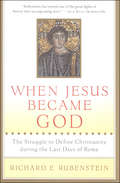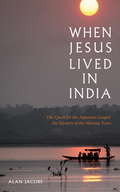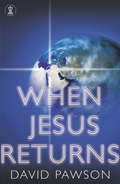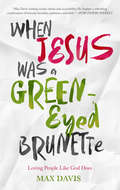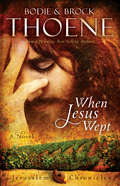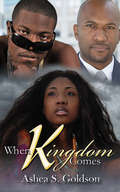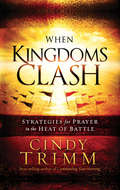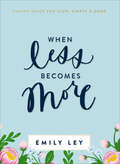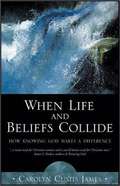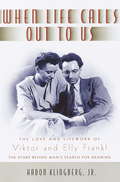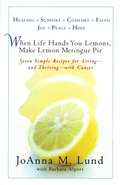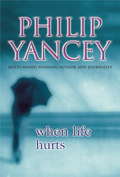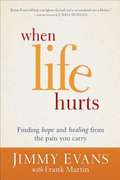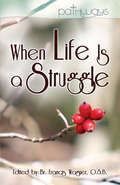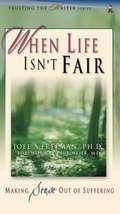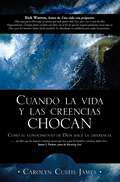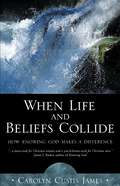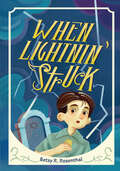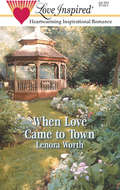- Table View
- List View
When Jessie Came Across the Sea
by Amy HestIn an inspiring pairing, Amy Hest and P. J. Lynch create an unforgettable tribute to the immigrant experience. Jessie lives with her grandmother in a poor village in the valleys of eastern Europe. When, to everyone's surprise, young Jessie is chosen by the village rabbi to travel to America, and to leave her grandmother behind, they both feel their hearts will break. Award-winning author Amy Hest brings her sure and inspired touch to the story of our immigrant heritage as she follows Jessie across the ocean to a new life--and a new love--in America. Exquisitely illustrated by P. J. Lynch, with paintings that glow with warmth and carefully observed detail, WHEN JESSIE COMES ACROSS THE SEA transcends time and culture in a tribute to the courage and hope of all who seek a better life. It is destined to become a modern classic.
When Jesus Became God: The Epic Fight over Christ's Divinity in the Last Days of Rome
by Richard E. RubensteinThe story of Jesus is well known, as is the story of Christian persecutions during the Roman Empire. The history of fervent debate, civil strife, and bloody riots within the Christian community as it was coming into being, however, is a side of ancient history rarely described. Richard E. Rubenstein takes the reader to the streets of the Roman Empire during the fourth century, when a fateful debate over the divinity of Jesus Christ is being fought. Ruled by a Christian emperor, followers of Jesus no longer fear for the survival of their monotheistic faith but break into two camps regarding the direction of their worship. Is Jesus the son of God and therefore not the same as God? Or is Jesus precisely God on earth and therefore equal to Him? The vicious debate is led by two charismatic priests. Arius, an Alexandrian priest and poet, preaches that Jesus, though holy, is less than God. Athanasius, a brilliant and violent bishop, sees any diminution of Jesus' godhead as the work of the devil. Between them stands Alexander, the powerful Bishop of Alexandria, who must find a resolution that will keep the empire united and the Christian faith alive. With thorough historical, religious, and social research, Rubenstein vividly recreates one of the most critical moments in the history of religion.
When Jesus Lived in India
by Alan JacobsThere have been many opinions about what happened during the eighteen 'missing' years of Jesus' life. Alan Jacobs presents and evaluates all the material, rendering it accessible for a modern readership, and weaving it into a compelling narrative.
When Jesus Returns
by David PawsonChristians everywhere await Christ's return. Will he come to the whole world or just one place? Soon and suddenly or after clear signs? What can he achieve by coming back here and how long will it take?Few theologians speak with such clarity and uncompromising biblical faithfulness as David Pawson. Based on a new approach to the intrpretation of the book of Revelation, Pawson here discusses in detail the controversial and misunderstood subject of the Rapture and uncovers the true significance of the Millennium.This popular and highly topical book is being re-issued with a striking new cover.
When Jesus Returns
by David PawsonChristians everywhere await Christ's return. Will he come to the whole world or just one place? Soon and suddenly or after clear signs? What can he achieve by coming back here and how long will it take?Few theologians speak with such clarity and uncompromising biblical faithfulness as David Pawson. Based on a new approach to the intrpretation of the book of Revelation, Pawson here discusses in detail the controversial and misunderstood subject of the Rapture and uncovers the true significance of the Millennium.This popular and highly topical book is being re-issued with a striking new cover.
When Jesus Was a Green-Eyed Brunette: Loving People Like God Does
by Max DavisWhen Jesus Was a Green-Eyed Brunette weaves heartwarming and miraculous stories of Jesus showing up in ordinary people, revealing that He knows us and is fully present in our everyday circumstances, especially in our difficulties. As best-selling author Max Davis puts it, "When we are born again, Jesus lives inside each of us. He is very much alive today and still does incredible things -- sometimes supernatural things -- through us!" Davis's own life was dramatically altered when he first came face-to-face with Jesus living inside a green-eyed brunette. That encounter started a forty-plus-year journey where Jesus became his best friend. When we see others as God sees us we will love them as God loves us. Those hurting and weary from worn-out religion are longing for a fresh touch from the living Jesus. By letting Jesus live through us we become a conduit of His love. Authentic Christianity is not about religion but a relationship with Jesus. Davis challenges us to do more than simply receive His grace -- we need to allow grace to soften, change, and shape us. As you read this book, you will laugh, cry, and come face-to-face with the living Jesus.
When Jesus Wept
by Bodie Thoene“Page-turning . . . Set against the political and religious turmoil of the times, the Thoenes’ story vividly reimagines the evolving friendship between Jesus and Lazarus.” —Publishers Weekly LAZARUS—the man Jesus raised from the dead in one of the most extraordinary encounters with The Living Savior in all of Scripture. But the life of Lazarus holds interest well beyond this miraculous event. Living in Bethany, near Jerusalem, Lazarus witnessed many of the most important events of Jesus’s life and ministry. Lazarus owned a vineyard and devoted his life to caring for its vines and fruit. But he encountered another man—Jesus—whose vineyard was the world, its fruit the eternal souls of men. When Lazarus’s story and the story of Jesus’s crucifixion and resurrection touch in When Jesus Wept, we are offered a unique vision into the power and comfort of Christ’s love. Brock and Bodie Thoene’s most powerful and climactic writing project to date, When Jesus Wept, captures the power and the passion of the men and women who lived through the most important days in the history of the world.
When Joy Came to Stay
by Karen KingsburyMaggie Stovall is trapped inside a person she's spent years carefully crafting. Now the truth about who she is--and what she's done--is bursting to the surface and sending Maggie into a spiral of despair. Will she walk away from everything, or can Maggie allow God to take her to a place of ultimate honesty--before it's too late? Maggie Stovall. One of the golden people. She has it all together. At least on the surface... Ben Stovall. Godly husband. Successful attorney. Has no idea of the darkness about to overtake his life... Amanda Joy. Child of society. Abused, broken, thrown away. But her trust in God is still alive... When Joy Came to Stay is the heart-wrenching story of one woman's descent into the shadows of depression, her husband's search for understanding, and a precious child's unwavering faith. "Kingsbury's poignant tale of a lost and broken family and how they experience God's miraculous healing is a sure guarantee to bring hope and joy to her readers." --Melody Carlson, bestselling author, Diary of a Teenage Girl series "A thought-provoking account of the battle of depression in a believer's life. It leaves no doubt that God is loving, merciful, and faithful." --Nancy Moser, author, The Mustard Seed seriesStory Behind the Book"Each of my novels is a piece of my heart. Where Yesterday Lives was my first-ever novel, and as such it is somewhat autobiographical. The childhood story of Ellen Barrett, her love for her parents and siblings, is my story--though her current story and struggles are fictional. On Every Side sheds light on the struggle for religious freedom in today's climate; something I am passionate about. Finally, When Joy Came to Stay is the story of one woman's battle against depression and the secrets of her past." --Karen KingsburyFrom the Trade Paperback edition.
When Kingdom Comes
by Ashea S. GoldsonAfter spending six years on death row in southern Louisiana, Trinity Crawford is finally declared innocent. She returns home to a mother who never wanted her. Immediately hit with a devastating medical diagnosis for her son, Trinity sets out in search of estranged family members. She travels first to New Orleans, to reconcile the past in order to reclaim her future. In her search to save her son, she enlists the help of her sassy Aunt Ruby, who helps her make sense of the strange visions she has always had. Trinity discovers the power of God that her paternal grandmother had told her so much about. As she wrestles with the relationship that has caused her the most pain in her life, she must also struggle with the only thing that hasn't been destroyed--her faith.When she has run out of time and resources, will the very weary Trinity give up on happiness, settling for what her mother calls her "bad luck," or will she realize that God is the only one who can heal the wounded and restore the lost?
When Kingdoms Clash: Strategies for Prayer in the Heat of Battle
by Cindy TrimmHarness the power of prayer The front lines of the clash between the kingdoms of darkness and light do not usually happen in our churches; they happen in our lives--in our workplaces, neighborhoods, where our children go to school, in our voting booths, and in the halls of influence. Our churches should be places of equipping and coordinating, but then we have to take this fight to the streets through daily prayer. When Kingdoms Clash takes you from the planning stages and strategies of prayer into the heat of the battle, showing you how to stand strong when things get intense. Using historical illustrations and teaching from Scripture, Cindy Trimm provides the tools you need to understand the power of prayer as never before. Battles are raging and the stakes are high; only through prayer will God’s kingdom prevail.
When Leadership and Discipleship Collide
by Bill HybelsAddressing the need to train and encourage Christian leaders, the Leadership Library gathers the experience and wisdom of proven leaders. These pocket-sized books can be read in one or two sittings. Purchase them in bulk and share them with colleagues and team members. The insights they contain are immediately applicable.
When Less Becomes More: Making Space for Slow, Simple & Good
by Emily LeyWomen today are more fatigued, burned out, and overwhelmed than ever. You may feel like your life is frantic––that you're running on empty. In When Less Becomes More, you'll learn how to live a life of more in a world that often overwhelms to the point of burnout. Smartphones constantly ping and alert and demand your attention. And social media can eat up hours of your days with mindless scrolling and tapping while leaving you feeling empty and lonely. Add to that family commitments, work that is accessible around the clock, and overscheduling, and you have a life that can feel out of control.In When Less Becomes More, Emily Ley, author of the bestselling Grace, Not Perfection and Growing Boldly, takes you on a journey out of that empty place and shows you how to fill your wells with the nourishment that only true connection can provide. She also presents some radical concepts that push against the tethers of modern life, with the promise that more of the good stuff comes when we say yes to less of what keeps us empty:Less Noise, More CalmLess Fake, More RealLess Rush, More RhythmLess Liking, More LovingLess Distraction, More ConnectionLess Chasing, More CherishingLess Stuff, More TreasuresGetting to more might require some outside-the-box changes, some unraveling of the patterns you have adopted, and some reworking of the day to day. Build a life based on your core values instead of slipping into a life dictated by society or what's "normal." Because you weren't made for normal. You were made for more––for a life of fullness, dreaming, and lasting joy.
When Life Calls Out to Us: The Love and Lifework of Viktor and Elly Frankl
by Haddon Klingberg Jr."The only authorized biography of Victor Frankl, whose life story and reflections have inspired tens of millions. Haddon Klingberg records and preserves the Frankl legacy, with his own eloquent and moving reflections." -- David G. Myers, Hope College, author of The American Paradox: Spiritual Hunger in an Age of Plenty. Written in response to the horrors he experienced and witnessed during the Holocaust, Viktor Frankl's landmark book, Man's Search for Meaning, has sold millions of copies and been translated into twenty-seven languages. But although Frankl's thought and philosophy have been widely analyzed, until now little has been written about his life, and about the deeply loving, intensely spiritual relationship that led him and his wife to dedicate their lives to reducing pain and oppression in the world. In a book that is at once a wonderful love story and a tribute to two extraordinary people, Haddon Klingberg, Jr., draws on a wealth of anecdotes, told to him by the Frankls themselves, to describe their separate early lives and their fifty-two years as husband and wife. Returning to Vienna after spending three years in four different concentration camps, Frankl, whose first wife and family died in the camps, turned to writing as a way of finding some purpose in his life. But it was Elly Schwindt, a woman half his age, who helped him put the pieces of his broken life together. Married in 1947, the Frankls created a life of hope and faith, a life committed to proclaiming the oneness of the human family, challenging materialistic values, and encouraging the pursuit of meaning. When Life Calls Out to Us chronicles a spiritual journey infused with tragedy but sustained by love, wisdom, faith, and humor. Klingberg's extensive interviews, not available anywhere else, reveal the full richness of the Frankls' lives and beautifully illuminate their enduring contributions toward a better world for all people.
When Life Hands You Lemons, Make Lemon Meringue Pie
by Joanna Lund Barbara AlpertBest-known as the creator of Healthy Exchanges ® cookbooks, JoAnna Lund not only turned her own life around with her sensible approach to healthy eating but also helped hundreds of thousands of people do the same. For more than a decade she's been sharing her common-folk wisdom through her many cookbooks, in her newsletter, on QVC, and during personal and media appearances around the country. But JoAnna has survived more than the diet wars. When she was diagnosed with a particularly aggressive form of breast cancer, the lessons that she had been sharing with friends and readers over the years were certainly tested, and none more so than one of her favorite maxims: When life hands you lemons, make lemonade. True to form, JoAnna knew that she had to take this lesson one big step further. In the kitchen, it meant whipping up some pretty scrumptious desserts, like her Heavenly Lemon Cream or Luscious Lemon Meringue Pie. In her life and in this book, it meant sharing her candid reflections and recounting the blessings that have kept her going through adversity to triumph. And this is JoAnna's most inspiring collection ever-recipes for support, comfort, and faith, for joy and peace. But most of all, they are recipes for healing and hope.
When Life Hurts
by Philip YanceyMany strong believers begin to feel disillusioned with God or to doubt their faith when faced with great pain or suffering. Even the strongest believers may begin to wonder where God is when they need him most or why he doesn't seem to care. In this book Philip Yancey inspires those for whom life hurts to look beyond their immediate suffering and to understand that God is offering an invitation to hope and a doorway to his gracious gifts.
When Life Hurts: Finding Hope And Healing From The Pain You Carry
by Frank Martin Jimmy Evans Chris HodgesWe all experience emotional pain--and even devastation--in our lives, but few of us know how to deal with it properly. Our unresolved pain accumulates deep within the recesses of our hearts, in a place Jimmy Evans calls the "hurt pocket." The more pain we accumulate, the more we are mentally, emotionally, and relationally crippled. But what if we could reach into that hurt pocket, confront our pain, and experience release and freedom?<P> Jimmy Evans shows readers how to completely remove and resolve every negative event from their past that is compromising their present and keeping them from their God-given destiny. He helps readers forgive others and themselves and discover true inner peace.<P> Perfect for individuals, as well as small groups and entire churches, When Life Hurts will help set people free from the pain of the past so they can live fully in the present and look forward to the future.
When Life Is a Struggle
by Brother Francis WagnerWhether the circumstances are chronic or urgently critical, we all encounter difficult periods in life. And in one way or another, we seek healing, comfort, or simply the strength to endure. This book offers encouraging words of hope. Rooted in the Catholic tradition, the chapters in this book express our belief that as the Body of Christ, we both hurt and heal together as we place our ultimate trust in God--who wishes to bring peace to each and every heart. This five-chapter book focuses on themes originally published as individual titles in our Catholic Perspectives CareNotes series.
When Life Isn't Fair
by Joel FreemanIt is perhaps the most-asked question in any time period: "Why does God allow suffering?" Certainly, every human experiences pain and rejection. If the difficulty is long-term, one can almost be driven mad with grief or anger. We want to know why. Physical and emotional problems are so draining, we become obsessed with "fairness." How do we reconcile our concept of a powerful, loving God with the fact of child death? Or greed? Divorce? Often, we don't. That is exactly where Joel Freeman finds many of the people he counsels. Rather than giving pat answers, he relies on spiritual tools to deal with pain. It's a method that has worked remarkably well, and one that can indeed help you or a loved one through a personal valley.
When Life and Beliefs Collide: Como el conocimiento de Dios hace la diferencia
by Carolyn Custis JamesSooner or later, life’s difficulties bring every Christian woman to God’s doorstep with questions too personal to ignore. “Why does God let me go through such painful circumstances?” “Why does he seem indifferent to my prayers?” We’re tired of spiritual pie in the sky. We want authentic, God-as-he-really-is faith—the kind that holds us together when our world is falling apart and equips us to offer strength and hope to others. When Life and Beliefs Collide raises a long-overdue call for us to think seriously about what we believe about God. With passion, brilliance, and eloquence, Carolyn Custis James weaves stories of contemporary women with episodes from the life of Mary of Bethany to illustrate the practical benefits of knowing God deeply. Examining the misperceptions and abuses that discourage women from pursuing a deeper understanding of God, this insightful book demonstrates how practical and down to earth knowing God can be.
When Life and Beliefs Collide: How Knowing God Makes a Difference
by Carolyn Custis JamesIn Praise of When Life and Beliefs Collide.Sooner or later, life’s difficulties bring every Christian woman to God’s doorstep with questions too personal to ignore. “Why does God let me go through such painful circumstances?” “Why does he seem indifferent to my prayers?” We’re tired of spiritual pie in the sky. We want authentic, God-as-he-really-is faith—the kind that holds us together when our world is falling apart and equips us to offer strength and hope to others.When Life and Beliefs Collide raises a long-overdue call for us to think seriously about what we believe about God. With passion, brilliance, and eloquence, Carolyn Custis James weaves stories of contemporary women with episodes from the life of Mary of Bethany to illustrate the practical benefits of knowing God deeply. Examining the misperceptions and abuses that discourage women from pursuing a deeper understanding of God, this insightful book demonstrates how practical and down to earth knowing God can be.“This outstanding book offers the best demonstration that everyone needs theology, the best expository account of Mary and Martha, and the best trajectory for women’s ministry in modern North America that I have yet read.” —James I. Packer“Thoughtful, scholarly, and motivating . . . should inspire and encourage women for years to come.” —Joni Eareckson Tada“You will not think the same way, nor hopefully be the same, after reading this thought-provoking book.” —Vonette Zachary Bright“. . . affirms women in their calling, chosen-ness, and gifting, and makes us know we are cherished and planned for.” —Jill Briscoe
When Life is Hard: Turning Your Trials Into Gold
by James MacDonaldWhen life is hard, really hard, we often spend all our time pleading, begging, yelling, refusing, and questioning. While none of these things are necessarily unusual, they are missing the ultimate point. When life is hard, when things get ugly, when all hope seems to be lost… that is when we are able to display the superiority of the life lived in God.It is in those moments of despair, when we question what is happening, when we don&’t know what to do, when some trials never seem to end, that we can lean most heavily on God&’s promises and truths.Working his way through five questions we've all had run through our heads, trusted pastor James MacDonald helps us understand what we should do now. We begin the journey by looking at different types of "trials", figuring out exactly what we're dealing with, and recognizing that God certainly knows. Second, the obvious question: "Why?" God sees us going through trials and we long for two things: for them to be over and to know why they happened in the first place. Next, we need to know what to do with these trials when they come (and they will most certainly come). Fourth, we have all wondered it, can trials be refused? Are God's purposes really being fulfilled in the midst of this trying time? And lastly, God reveals Himself to us through these trials. . . and sometimes, they just don't ever end. Why doesn't this trial go away? God told us to expect trials—don&’t be surprised when they come. Grow when they come. Find hope when they come.
When Life is Hard: Turning Your Trials Into Gold
by James MacDonaldWhen life is hard, really hard, we often spend all our time pleading, begging, yelling, refusing, and questioning. While none of these things are necessarily unusual, they are missing the ultimate point. When life is hard, when things get ugly, when all hope seems to be lost… that is when we are able to display the superiority of the life lived in God.It is in those moments of despair, when we question what is happening, when we don&’t know what to do, when some trials never seem to end, that we can lean most heavily on God&’s promises and truths.Working his way through five questions we've all had run through our heads, trusted pastor James MacDonald helps us understand what we should do now. We begin the journey by looking at different types of "trials", figuring out exactly what we're dealing with, and recognizing that God certainly knows. Second, the obvious question: "Why?" God sees us going through trials and we long for two things: for them to be over and to know why they happened in the first place. Next, we need to know what to do with these trials when they come (and they will most certainly come). Fourth, we have all wondered it, can trials be refused? Are God's purposes really being fulfilled in the midst of this trying time? And lastly, God reveals Himself to us through these trials. . . and sometimes, they just don't ever end. Why doesn't this trial go away? God told us to expect trials—don&’t be surprised when they come. Grow when they come. Find hope when they come.
When Lightnin' Struck
by Betsy R. RosenthalIt’s 1928 in Odessa, Texas, and eleven-year-old James is struggling to find his purpose in life and to uncover a family secret. With his father struck dead by lightning and his mother in jail, he is taken in by his grandparents. Treated as a pariah at school, James is taunted as being cursed by his family’s bad luck. But he finds a friend in Paul, a Russian immigrant, who is also treated as an outcast, and together, they battle the school bully. But James's life is turned upside-down yet again when he uncovers a family secret involving his beloved grandmother. His discovery leads him to find the sense of purpose he's been seeking.
When Love Came to Town
by Lenora WorthTO THE RESCUEAs far as Mick Love was concerned, the tornado that had devastated tiny Jardin, Louisiana, had nothing on the tempestuous, wildly beautiful Lorna Dorsette. Mick had come all the way from Mississippi to help restore her aunt' s ruined plantation-not for a whirlwind romance with a fiery, Bible-quoting blue blood who had more secrets than the murky bayou....After praying for help in the wake of the storm, Lorna was convinced Mick' s tree service was heaven-sent. As for her rugged rescuer, she had every intention of restoring his faith and resisting his charms....

